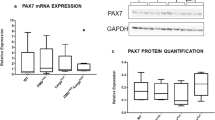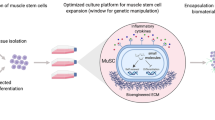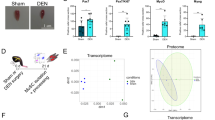Abstract
MINCED skeletal muscle regenerates with autotransplantation and homotransplantation in the rat1,2, and with heterotrans-plantation in the mouse3. If the distal stump of peripheral nerve is positioned in the proximity of the mince, motor units are believed to develop within 75 days, and stimuli applied to the nerve should elicit a contraction in the regenerate muscle (personal communication from Dr B. M. Carlson).
This is a preview of subscription content, access via your institution
Access options
Subscribe to this journal
Receive 51 print issues and online access
$199.00 per year
only $3.90 per issue
Buy this article
- Purchase on Springer Link
- Instant access to full article PDF
Prices may be subject to local taxes which are calculated during checkout
Similar content being viewed by others
References
Studitsky, A. N., and Rumyantseva, O. N., Doklady Akad. Nauk SSSR, 155, 1465 (1964).
Carlson, B. M., Amer. J. Anat., 128, 21 (1970).
Pietsch, P., Proc. Soc. Exp. Biol. and Med., 117, 927 (1964).
Mann, W. S., and Salafsky, B., J. Physiol., 208, 33 (1970).
Sandow, A., and Brust, M., Amer. J. Physiol., 194, 557 (1958).
McArdle, B., Exploratory Concepts in Muscular Dystrophy and Related Disorders, 334 (Excerpta Medica, Amsterdam, 1967).
Pearson, C. M., Exploratory Concepts in Muscular Dystrophy and Related Disorders, 339 (Excerpta Medica, Amsterdam, 1967).
Sreter, F. A., Ikemoto, N., and Gergely, J., Exploratory Concepts in Muscular Dystrophy and Related Disorders, 289 (Excerpta Medica, Amsterdam, 1967).
Sugita, H., Okimoto, K., Ebashi, S., and Okinaka, S., Exploratory Concepts in Muscular Dystrophy and Related Disorders, 321 (Excerpta Medica, Amsterdam, 1967).
McComas, A. J., Sica, R. E. P., and Currie, S., Nature, 226, 1263 (1970).
Schmidt, A. J., The Cellular Biology of Vertebrate Regeneration and Repair (University of Chicago Press, 1968).
Salafsky, B., Bell, J., and Prewitt, M. A., Amer. J. Physiol., 215, 637 (1968).
Prewitt, M. A., and Salafsky, B., Amer. J. Physiol., 218, 69 (1970).
Buller, A. J., Eccles, J. C., and Eccles, R. A., J. Physiol., 150, 417 (1960).
Gutmann, E., The Denervated Muscle (Czechoslovak Academy of Sciences, Prague, 1962).
Guth, L., Physiol. Rev., 48, 645 (1968).
Barondes, S. H., and Samson, jun., F. E., Axoplasmic Transport (Neurosciences Research Program, Brookline, Massachusetts, 1967).
Bird, M. T., and Shuttleworth, jun., E. C., Twenty-Second Ann. Meeting Amer. Acad. Neurol., Bar Harbor, Florida, Abstract NA2 (1970).
Author information
Authors and Affiliations
Rights and permissions
About this article
Cite this article
SALAFSKY, B. Functional Studies of Regenerated Muscles from Normal and Dystrophic Mice. Nature 229, 270–272 (1971). https://doi.org/10.1038/229270a0
Received:
Revised:
Issue Date:
DOI: https://doi.org/10.1038/229270a0
This article is cited by
-
Time course of regeneration of minced frog muscles estimated by the level of energetic substrates
Pfl�gers Archiv European Journal of Physiology (1976)
-
State of play in the neural hypothesis of muscular dystrophy
Nature (1974)
-
Neural hypothesis of muscular dystrophy is flourishing
Nature (1974)
-
Reduced axoplasmic transport of choline acetyltransferase activity in dystrophic mice
Nature (1974)
-
Chimaera mouse study shows absence of disease in genetically dystrophic muscle
Nature (1974)
Comments
By submitting a comment you agree to abide by our Terms and Community Guidelines. If you find something abusive or that does not comply with our terms or guidelines please flag it as inappropriate.



